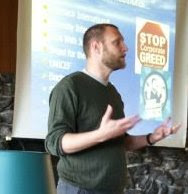Prophets and Capitals
"It is impossible for a prophet to be killed outside of Jerusalem."
It isn't impossible for anyone to be killed outside of Jerusalem... just take them outside the city walls and execute them there! Jesus isn't making a statement about someone being killed, so much as he is making a statement about being a prophet. What makes someone a prophet is if they speak truth to power, if they confront the Powers That Be on their own territory with the word and will of God. And in an occupied land, Jesus preaching his message of renewal and resistance, Jesus must eventually preach it at the seat of the oppressive occupation - in Jerusalem. (For the same reason that Paul, speaking to the whole Roman Empire, must preach - and be killed - in Rome.)
If one is to be a prophet, one must speak truth to power - and worldly powers are seated in capitals (unlike the Reign of God which is spread throughout creation, and thus has no "capital"). Jesus is declaring his intention to continue the prophetic critique of the status quo. The prophetic voice - so strong and clear throughout much of Hebrew history - in Jesus' time had not been heard again for several hundred years. Jesus knew that God continued God's desire for unity, solidarity, charity, hospitality... and felt called to give voice to God's longing.
A capital is the centerplace of earthly organization - it concentrates wealth and resources, it decides where to allocate resources and attention, it guides the machinations of institutionalized relationship between people. It has so much potential for good, but so easily falls prey to greed, gluttony, and deceit. Still, Jesus weeps over the city and its wasted potential. It could be so much, do so much, feed so many, lift so many out of poverty, answer so many needs - but it refuses to do so. Even though Jesus senses that he is facing his death by bringing this critical voice to the capital (particularly at a nationalist festival time when crowds are already gathered and restless), he still feels a loving lament for the city. He wanted to gather Jerusalem like a hen gathers her chicks - a surprisingly warm and intimate sentiment, given his critical stance and Jerusalem's likely violent reaction. You can see here Jesus' underlying love for this world - even the fallenness of it. No part of this world is beyond redemption.
This is a tough call for me. It is as if I walked to Washington D.C. and into the White House and told George W. Bush that I loved him, that God loves him, and that he must stop being an international terrorist. If I could gather a crowd to listen to and support me, I might be arrested and detained as a terrorist myself (perhaps tortured and executed as well). But even in the midst of all that drama, Jesus would have me still see Washington as redeemable. I can see tremendous potential in Washington, but considering the tremendous suffering it has inflicted and is inflicting the world over, I find it difficult to see it as redeemable, let alone worth loving. But this is what I am called to do, as a disciple of Jesus.
This isn't some "Love America" spiel. Bush is called to make the same journey to Baghdad, or the Sunni Triangle, or whatever outpost of resistance that seems to be leading at the moment. I'm not saying America is ok in what it is doing - just as Jesus was not condoning the brutality of the Roman occupation by preaching in Jerusalem. But Jesus brought a loving critique. And that is what I have to remember. "Washington, Washington, the city that kills the prophets and stones those who are sent to it! See, your house is left to you - you will not see Christ until you say 'Blessed is the one who challenges us in the name of the Lord.'"



0 Comments:
Post a Comment
<< Home